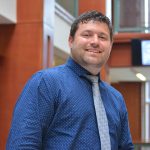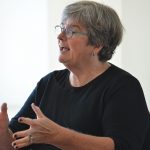Cooper said members of the UConn campus community felt this was an important time to reaffirm their commitment to the university being a safe and invigorating place where intellectual, educational, and personal growth are valued and manifested.
The U.S. Department of Education has awarded $1.3 million in funding through its Office of Special Education Programs (OSEP) to the Neag School’s special education program for a project that will fully fund five doctoral students in the areas of literacy, positive behavioral supports, and transition, with four-year competitive fellowships for each student.
Two Neag School researchers are members of an interdisciplinary UConn-based team recently awarded a $3 million grant through the National Science Foundation (NSF) Research Traineeship program to prepare the next generation of Ph.D. students.
The Neag School of Education welcomes three new faculty members this fall.
Current Ph.D. student and two-time Neag School alumnus Kevin Liner ’10 (CLAS), (ED), ’11 MA is knee-deep in his doctoral studies, focusing his research interests on mathematics education.
Last year, IES funded a CTE research project under a different topic, Improving Education Systems. In this project, the University of Connecticut is examining the impact of attending a CTE-focused high school on students’ achievement, high school graduation, and college enrollment.
Neag Endowed Professor of Teacher Education Suzanne M. Wilson has been named head of the Department of Curriculum and Instruction (EDCI) at the Neag School. She takes over for Mary Anne Doyle, who served as department head for 17 years and returned to a faculty role to focus on literacy research.
Neag School alumna Jennifer Lanese ’94 (ED), ’95 MA authors this original piece, reflecting on the meaning of privilege, its impact in the classroom, and how educators can work toward fostering a culturally competent learning environment for their students.
The researchers, Shaun Dougherty and Jennie Weiner of the University of Connecticut, looked at two tiers of struggling schools in the state: “warning” and “focus” schools. Schools in both categories had to choose four changes to make. Focus schools, the lower-performing group, had to select from a prescribed list, while warning schools could also could come up with their own strategies.
“By [2019], rent could be taking up a very high percentage of the school’s budget,” said Preston Green III, a University of Connecticut education professor who has written extensively on charter schools. “And if so, the school is going to be cash poor. This is a problem that a number of charter schools have had to deal with. This is something that’s happening across the nation.”






